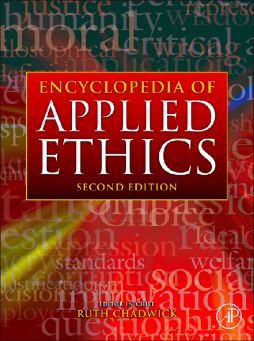
Additional Information
Book Details
Abstract
The Encyclopedia of Applied Ethics, Second Edition addresses both the physiological and the psychological aspects of human behavior. Carefully crafted, well written, and thoroughly indexed, the encyclopedia helps users - whether they are students just beginning formal study of the broad field or specialists in a branch of psychology - understand the field and how and why humans behave as we do.
The work is an all-encompassing reference providing a comprehensive and definitive review of the field. A broad and inclusive table of contents ensures detailed investigation of historical and theoretical material as well as in-depth analysis of current issues. Several disciplines may be involved in applied ethics: one branch of applied ethics, for example, bioethics, is commonly explicated in terms of ethical, legal, social, and philosophical issues. Editor-in-Chief Ruth Chadwick has put together a group of leading contributors ranging from philosophers to practitioners in the particular fields in question, to academics from disciplines such as law and economics.
The 376 chapters are divided into 4 volumes, each chapter falling into a subject category including Applied Ethics; Bioethics; Computers and Information Management; Economics/Business; Environmental Ethics; Ethics and Politics; Legal; Medical Ethics; Philosophy/Theories; Social; and Social/Media.
- Concise entries (ten pages on average) provide foundational knowledge of the field
- Each article will features suggested readings pointing readers to additional sources for more information, a list of related websites, a 5-10 word glossary and a definition paragraph, and cross-references to related articles in the encyclopedia
- Newly expanded editorial board and a host of international contributors from the US, Australia, Belgium, Canada, France, Germany, Ireland, Israel, Japan, Sweden, and the United Kingdom
- The 376 chapters are divided into 4 volumes, each chapter falling into a subject category including Applied Ethics; Bioethics; Computers and Information Management; Economics/Business; Environmental Ethics; Ethics and Politics; Legal; Medical Ethics; Philosophy/Theories; Social; and Social/Media
"This authoritative four-volume reference has a broad reach, encompassing the various fields and endeavors in which ethical issues arise as well as the field of practical ethics itself and a variety of historical, con- temporary, religious, and secular approaches. Written by an international roster of philosophers, practitioners in numerous fields, and academics from disciplines such as law and economics, this is a resource of value to an equally diverse audience. The second edition is a substantial revision and expansion of the 1998 first edition, both in terms of ongoing thinking about older topics and in terms of new topics introduced by events and developments of the intervening years. Entries are fully developed, well-structured, signed articles, each enhanced with a brief glossary, a bibliography, website references, and brief bios of the contributing authors. A subject classification in the front matter lists entries under the following broad themes: applied ethics, bioethics, computers and information management, economics and business, environment, politics, education, law, medicine, philosophical theories, social, and media. A more specific sampling of topics: reality TV, biometric technologies, race and genomics, electronic surveillance, land use issues, tourism, religion in schools, victimless crimes, obesity, rights theory, gender roles, and social services, among many, many others." --Reference and Research Book News, August 2012
"The last 15 years have seen watershed movements in ethics, especially applied ethics. The second edition of this encyclopedia reflects these changes, touching on developments in medicine, information technology, and privacy among others…The scope of the content and the quality of the articles (especially the discussions of the relationship of hermeneutics to applied ethics) will appeal to the full range of students, specialists, and interested readers. Summing up: Highly recommend. Lower-division undergraduates and above; general readers." --CHOICE, November 2012
